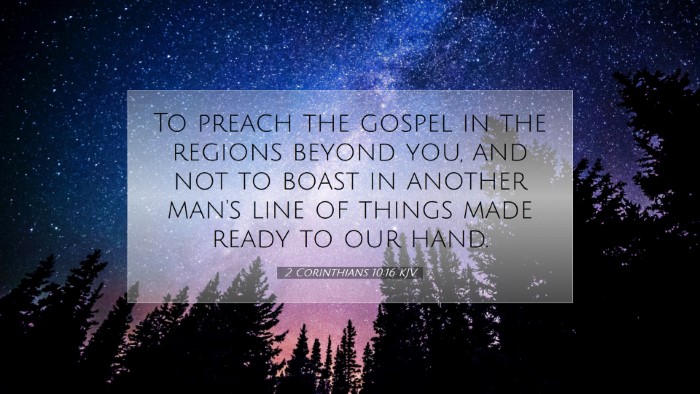Commentary on 2 Corinthians 10:16
This passage reveals significant themes regarding the apostolic mission and the nature of spiritual warfare.
Text of 2 Corinthians 10:16
“To preach the gospel in the regions beyond you, and not to boast in another man's line of things made ready to our hand.”
Overview
In this verse, the Apostle Paul expresses his intent to advance the Gospel beyond the established territories where he had ministered previously. This reflects a deep commitment to fulfilling the Great Commission and an understanding of the importance of expanding the reach of the Gospel.
Insight from Commentaries
Matthew Henry's Perspective
Henry underscores that this verse highlights Paul’s focus on his apostolic duty. He states:
- Extension of Influence: Paul aims to carry the gospel to new areas, indicating that the mission is ever-expanding. The Gospel is not merely for a confined audience but is for all nations.
- Refraining from Boasting: He refrains from boasting about the success of others, illustrating a critical humility; Paul is aware that each minister is given unique tasks and rewards by God.
- Unity in Purpose: The mention of a 'line of things' points to the unity of purpose among believers in spreading the Gospel rather than competing with one another.
Albert Barnes' Commentary
Barnes provides a practical analysis that focuses on the implications of Paul's statement:
- Regions Beyond: Barnes elucidates that the phrase "regions beyond" signifies a deliberate outreach, reinforcing that it is the Church’s calling to reach those who have not yet heard the Gospel.
- Expression of a Missionary Spirit: There is a sense of urgency in Paul's approach, portraying a heart that beats for missionary work, reflecting Jesus' commission.
- Expectation of Results: This verse embeds the belief that God prepares the harvest, a foundational truth for all who undertake the Gospel ministry.
Adam Clarke's Commentary
Clarke interprets this verse with emphasis on its theological underpinnings:
- Theological Context: Clarke notes that Paul's strategy was motivated by both a sense of necessity and divine direction, suggesting a reliance on the Holy Spirit for guidance.
- Gratitude and Acknowledgment: He discusses the need to acknowledge the work of other servants in the Gospel, cautioning against envy and rivalry, essential traits for ministers today.
- Call to Action: The insistence on moving into new territories resonates with the modern call for church growth and outreach, and Clarke provides a reminder that action is paramount in the Christian life.
Thematic Analysis
This verse encapsulates several critical themes relevant for contemporary Christians, theologians, and church leaders:
1. Apostolic Authority and Mission
Paul's words underscore the authority that comes from being sent, a theme that resonates deeply in the context of teaching and preaching today. The recognition of authority is vital in establishing credibility and fostering trust within the community.
2. Spiritual Warfare
The context of the surrounding chapters emphasizes the struggle against spiritual forces. Paul's readiness to engage in the battle for souls demonstrates that outreach efforts are inherently spiritual confrontations.
3. The Call for Humility
In a landscape often marred by competition, we are reminded by Paul’s example to remain humble, focusing on God’s work rather than our glory. The Kingdom of God thrives not on human accolades but on divine purpose.
Practical Application
For pastors, students, and scholars, this commentary serves as a basis for understanding how to live out the implications of 2 Corinthians 10:16:
- Outreach Initiatives: Christians are encouraged to think beyond their immediate circle, to engage in mission-oriented activities that promote the Gospel.
- Fostering Collaboration: Emphasizing collaboration among ministries and believers can enhance efforts, moving the collective mission forward in a powerful way.
- Continuous Learning: The church must invest in learning from others, understanding that the body of Christ is made up of many members with diverse gifts and purposes.
Conclusion
2 Corinthians 10:16 stands as a clarion call for believers to broaden their horizons in Gospel ministry while embodying humility and cooperation. The insights drawn from Matthew Henry, Albert Barnes, and Adam Clarke provide a rich tapestry of understanding that can inspire current and future generations of Christians in their walk and work for the Kingdom of God.


